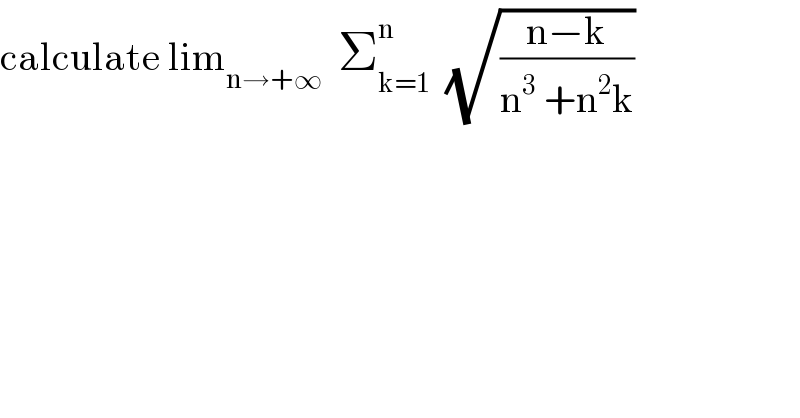
Question and Answers Forum
Previous in Relation and Functions Next in Relation and Functions
Question Number 111755 by mathmax by abdo last updated on 04/Sep/20

Answered by Dwaipayan Shikari last updated on 04/Sep/20
![(1/n)lim_(n→∞) Σ_(k=1) ^n (√((n−k)/(n+k ))) =(1/n)lim_(n→∞) (√(((1−(k/n))/(1+(k/n))) )) =∫_0 ^1 (√((1−x)/(1+x)))dx =∫_0 ^1 ((1−x)/( (√(1−x^2 )))) =∫_0 ^1 (1/( (√(1−x^2 ))))+(1/2)∫_0 ^1 ((−2x)/( (√(1−x^2 )))) =[sin^(−1) x]_0 ^1 +[(√(1−x^2 )) ]_0 ^1 =(π/2)−1](Q111759.png)
Answered by mathmax by abdo last updated on 07/Sep/20
![let S_n =Σ_(k=1) ^n (√((n−k)/(n^3 +n^2 k))) ⇒ S_n =Σ_(k=1) ^n (√((n(1−(k/n)))/(n^3 (1+(k/n))))) =(1/n) Σ_(k=1) ^n (√((1−(k/n))/(1+(k/n)))) →∫_0 ^1 (√((1−x)/(1+x)))dx (S_n is Rieman sum) we do the changement x =cosθ ⇒∫_0 ^1 (√((1−x)/(1+x)))dx =∫_(π/2) ^0 (√((2sin^2 ((θ/2)))/(2cos^2 ((θ/2)))))(−sinθ)dθ =2∫_0 ^(π/2) ((sin((θ/2)))/(cos((θ/2)))) sin((θ/2))cos((θ/2))dθ =∫_0 ^(π/2) 2sin^2 ((θ/2))dθ =∫_0 ^(π/2) (1−cosθ)dθ =(π/2) −[sinθ]_0 ^(π/2) =(π/2)−1 ⇒lim_(n→+∞) S_n =(π/2)−1](Q112255.png)
